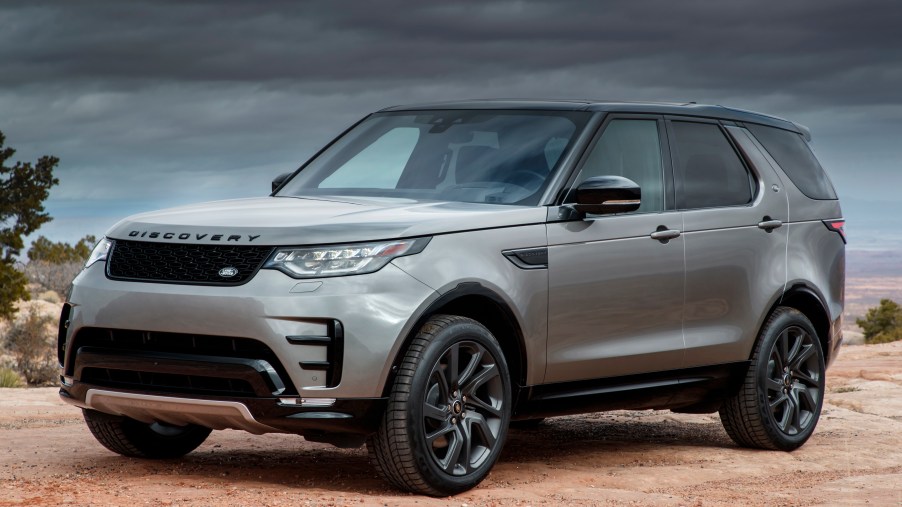
Will BMW Buy Jaguar Land Rover?
What if a certain iconic German automaker decided to buy an equally iconic British one? As Automotive News Europe reports, that’s the scenario that analysts at Sanford C. Bernstein have envisioned for BMW: to buy Jaguar Land Rover from India’s Tata Motors. It’s an intriguing idea to consider. But at this point, it’s just an idea.
Both sides face challenges
The Bernstein analysts say that BMW is overcapitalized: it has extra cash to invest. And the carmaker needs to grow beyond its current product range and brand.
One of BMW’s other challenges is that it’s caught between the U.S. and China in their trade showdown, which has slowed profits. Also, the uncertainty of the UK’s political climate affects BMW negatively, where it manufactures the Mini and the Rolls-Royce.
Jaguar Land Rover’s situation is more uncertain. The Tata subsidiary is financially strapped and operationally burdened. Guidance from a larger partner such as BMW would help it to bring down costs. To add to JLR’s troubles, its parent company Tata is suffering from growing losses as well as both a slowing of sales in China and troubles caused by Brexit.
What it would take for this deal to happen
If BMW purchased JLR for $11.2 billion, the German automaker could boost its earnings by 20%. This transaction would also increase BMW’s sales volumes by almost 25%. But accepting BMW’s offer would probably feel like a concession to Tata. The Indian carmaker would have to set aside its pride to sell its most valuable asset.
To complete this deal, BMW would need to overcome some of its characteristic traditionalism. Also, the transaction would be emotionally challenging since BMW owned Land Rover and the bigger Rover Group back in the 1990s. The Rover Group was split in 2000, and BMW sold Land Rover to Ford and kept Mini and Rolls-Royce. Some of the BMW execs who were there at the time still haven’t gotten over the experience of letting Land Rover go.
The global financial landscape has BMW and JLR both taking cost-cutting measures. BMW is working through a $14 billion savings plan to head off an anticipated slump in profits caused by world trade conflicts. The carmaker plans to discontinue niche models such as the 3 Series Gran Turismo, the 6 Series Gran Turismo, and the 6 Series Gran Coupe to reduce operating expenses.
Jaguar Land Rover has also launched a savings program. It’s worth more than $3 billion and 4,500 jobs will be cut. After years of being profitable, JLR lost more than $430 million between the last quarter of 2018 and the first quarter of 2019. Declining sales, high costs, and production freezes all contributed to this loss.
Some of the money that BMW and JLR save from these programs will go towards a new EV development project. The carmakers committed to the project earlier this year. This collaboration might be one of a few possible reasons why the Bernstein analysts have floated their recommendation.
Tata bought JLR from Ford in 2008 for $2.3 billion and seems to be struggling to find ways to help its subsidiary thrive. Despite its public denial, it is rumored that the Indian conglomerate has been sorting out ways to raise funds. They range from a stake sale to a joint venture. But BMW has made it clear that it doesn’t want to have equity ties or participation with JLR.
Why this idea is appealing
Both BMW and Tata were mum when reporters asked about the Bernstein recommendation, and there’s a good chance that this transaction won’t happen anytime soon—if at all.
But BMW and JLR share a connection in leadership that may make the transaction easier: JLR’s CEO Ralf Speth, who worked for BMW from 1980 to 2000. We don’t know what Speth’s opinion is about this or what the circumstances were when he left BMW. But we’d hope that his past ties with the German auto manufacturer would help ease the transition.
What’s more, we believe that both companies could benefit from this acquisition. With collaboration on electric powertrain tech already in the making, BMW and JLR have already laid the groundwork for teamwork on a much larger scale.
One advantage for JLR in this deal would be that BMW is large enough to share resources, technology, and manufacturing facilities with the cash-strapped subsidiary. If current global trade conflicts ease, both carmakers could win market shares and increase profits with the right strategy.
An even more significant benefit for Jaguar Land Rover is that BMW has a strong understanding of what makes a successful luxury car brand. Tata is excellent in its role as a multinational mega-conglomerate that produces chemicals, consumer goods, steel, energy, and information technology products. It’s also very good at being India’s largest automaker and for producing very affordable cars.
But it seems as if the conglomerate has run out of ideas about how to bring JLR back on course. This is where BMW’s vast experience in producing high-end vehicles would be extremely helpful.
So, in a context loaded with financial challenges and emotional stumbling blocks, the likelihood of BMW buying JLR is very low. But, like putting together your favorite fantasy sports team, it’s fun to imagine, isn’t it?


